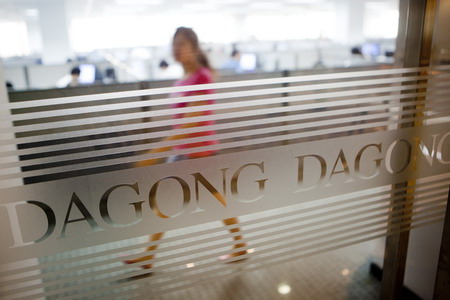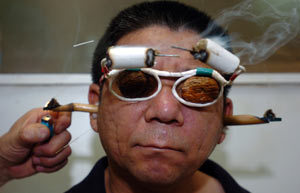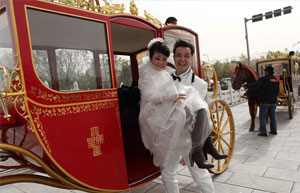Workers suffering from information overload
Updated: 2010-11-22 14:44
By Zhou Siyu (China Daily)
|
 |
|
An employee of Dagong Global Credit Rating Co Ltd walks through the company's office in Beijing. Information overload for white collar workers has become a global issue, according to the report conducted by LexisNexis. [Photo / Bloomberg] |
BEIJING - Employees are being deluged with excess information that is not relevant to their work, according to a new survey.
Sixty-two percent of Chinese white collar workers said they will be unable to handle the amount of information they received in their daily work if it continues to grow, according to the report conducted by LexisNexis, a United States-based provider of database services and electronic research.
More than 1,700 white collar workers in China, the United States, South Africa, United Kingdom and Australia participated in the survey. Three hundred were from China.
According to the findings, 61 percent of Chinese white collar workers felt the amount of information grew "significantly" after the international financial crisis. The average percentage was 59 percent.
On average, white collar workers spend 51 percent of their work time receiving and processing information. They said only one third of it was relevant to their work, the survey found.
Information overload for white collar workers has become a global issue. In the US, time consumed by information management increased by 10 percent compared with 2008.
The situation in China is cause for concern. Because of inadequate communications and problematic scheduling caused by the overwhelming amount of information, 50 percent of Chinese white collar workers miss at least one meeting or appointment every week, ranking highest among the five countries, the survey showed.
Australia came second, with only 28 percent of white collar workers reporting the same problem.
Also, as many as 66 percent - also the highest - of Chinese white collar workers have to re-build their files lost "mysteriously" or "by mistake" at least once a week.
"According to the survey, white collar workers are not complaining about their workload. Instead, it is the overwhelming amount of information that has already affected their efficiency in management, as well as their performance at work," said Long Xiaohong, business operations director at LexisNexis in China.
Buried with e-mails
Jin Shuai is a white-collar worker at the human resources department of a Germany-based auto parts company in Shanghai. Every morning she opens her e-mail box, only to find it crammed with at least 50 unread mails.
|
|||||||
"It will be unbearable for them if the situation gets worse," she said.
As foreign businesses flourished across the country, Chinese white collar workers gradually developed a habit of communicating through e-mails at work, which added even more to their already crowded e-mail boxes.
The common problem of the over-crowded e-mail box is that it will lead to distraction.
In the US, 85 percent of white collar workers complained the stream of e-mails distracts them from the work in hand, the survey showed.
"I myself am a victim of the overwhelming amount of e-mails. I have to deal with at least 70 e-mails every day. So I imposed a strict rule in the office that e-mails that don't involve me should never be copied to my in box," said Long.
"If they do not stop sending me e-mails, I will have no time for real work."
Paper's Digest

China bags Asiad team tennis title after 24 yrs
Wimbledon semifinalist Li Na led host China to capture the team tennis title on Tuesday at the Asian Games, accomplishing her Asiad tour with three consecutive victories.
China rate rises no panacea to curb inflation: PBOC adviser
Specials

Russian possessed with TCM
Born into a family of doctors, Maxime became interested in Traditional Chinese Medicine (TCM) at the age of 12, after hearing about TCM theories such as health preservation and recuperation.

Acupuncture takes stab at UNESCO list
Acupuncture and Peking Opera have been selected as candidates for UNESCO intangible cultural heritage status.

The wedding coach comes back to life
A groom carries his bride from a wedding coach in Xuchang, Henan province, Nov 11, 2010. Produced a local factory, various original hand-made wedding carriages were displayed on the streets, attracting young people chasing fashion and an environment-friendly lifestyle.



